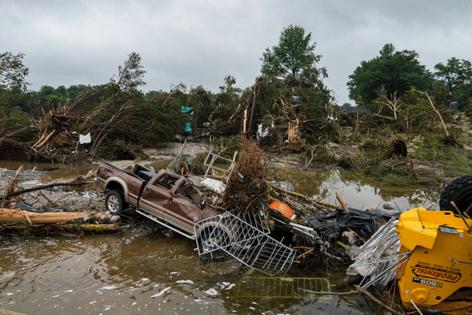Heidi Stevens: As our land literally burns, we don't owe the president quiet subservience
Published in Lifestyles
On July 23 — three weeks into a month that saw close to 100 million Americans living under heat alerts, 17 million people living under flash flood warnings and Oregon’s massive Cram Fire barreling toward its 100,000th acre burned — the United Nations' highest court declared climate change an “urgent and existential threat.”
"The human right to a clean, healthy and sustainable environment is essential for the enjoyment of other human rights," World Court Judge Yuji Iwasawa said in the court’s advisory opinion.
The court ruled that countries must, under international law, address climate change by working to reduce greenhouse gas emissions.
The Trump administration just drafted a plan to do the opposite.
Under a new proposal sent to the White House, the Environmental Protection Agency would rescind 2009’s "endangerment finding," which scientifically validates that greenhouse gases threaten the public health and welfare of current and future generations.
That finding is what allows — and compels — the federal government to limit the toxins that pollute our air and contribute to climate change. Rescinding that finding is what allows — and compels — the federal government to look the other way while the world, quite literally, burns.
The EPA proposal would also, according to the New York Times, rescind limits on tailpipe emissions, freeing up the transportation sector — the largest source of greenhouse gas emissions in the U.S. — to spew more of the toxins that have been linked to smog, respiratory problems, cardiovascular issues and climate change.
Make pollution great again.
Every week, there’s a new example of the upside-down logic at work in the White House: platitudes that say one thing, policies that portend another.
Oregon’s Cram Fire is one of 40,934 wildfires that have burned in the United States in 2025. At least 135 people were killed in Texas flash floods over the July 4 weekend, including at least 27 counselors and young girls at Camp Mystic Christian summer camp. Weather disasters have cost the United States billions of dollars so far this year.
An urgent and existential threat, indeed. But the very people we elected to serve us — and save us — are working to drown out the science and the solutions that would slow the climate’s deadly march.
President Donald Trump would rather protect us from Rosie O’Donnell, who he called a “threat to humanity.” He wants to strip the actress of her U.S. citizenship, claiming she is “not in the best interests of our Great Country” because of her longtime criticism of Trump.
Is this a tactic to distract us from the Epstein files? From the lawsuits against the Department of Homeland Security and the Federal Emergency Management Agency? From any number of issues that don’t place this administration in a flattering light?
Sure. Possibly. Still, it’s worth noting that threatening O’Donnell — or Bruce Springsteen, or Beyoncé or Zohran Mamdani, the Democratic nominee for mayor of New York City — because they’ve criticized the president and his policies is a dangerous and wildly ill-informed approach.
Criticizing the president of the United States is very much in the best interests of our great country. It's actually in the vital interests of our great country. A country that doesn't allow citizens to criticize their leaders is not a democracy. It's not where liberty or justice flourish.
Criticizing the president — whatever party he belongs to — is one of the most American things you can do. The Founding Fathers believed that so strongly they codified it in the First Amendment.
There are reams of court cases upholding a citizen's right to criticize the U.S. government. But you shouldn't need to check a single one to know this is all wrong. Check your gut.
In a haunting guest essay in the New York Times, former U.S. ambassador to Hungary David Pressman writes about watching the rise of a strongman in Hungary and seeing the parallels all around him here.
“After years watching Hungary suffocate under the weight of its democratic collapse,” Pressman writes, “I came to understand that the real danger of a strongman isn’t his tactics; it’s how others, especially those with power, justify their acquiescence.”
That acquiescence doesn’t happen overnight. Or by accident. So it’s worth noting — and resisting — when dissent is threatened with punishment, including outright banishment.
So much of what makes this nation great is at risk of disappearing: our ingenuity, our moral authority, our willingness to work toward a better, healthier, more equitable version of ourselves — a version that comes closer to the ideals set out by, if not always lived out by, our Founding Fathers.
So much of what needs our urgent attention, meanwhile, is going unaddressed.
The president serves the people. The people don't serve the president. And the people certainly don't owe the president quiet subservience.
Not when so much of what we hold dear, so much of what’s precious and vulnerable, so much of what we live for and love, is at stake.
©2025 Tribune News Service. Distributed by Tribune Content Agency, LLC.
























Comments